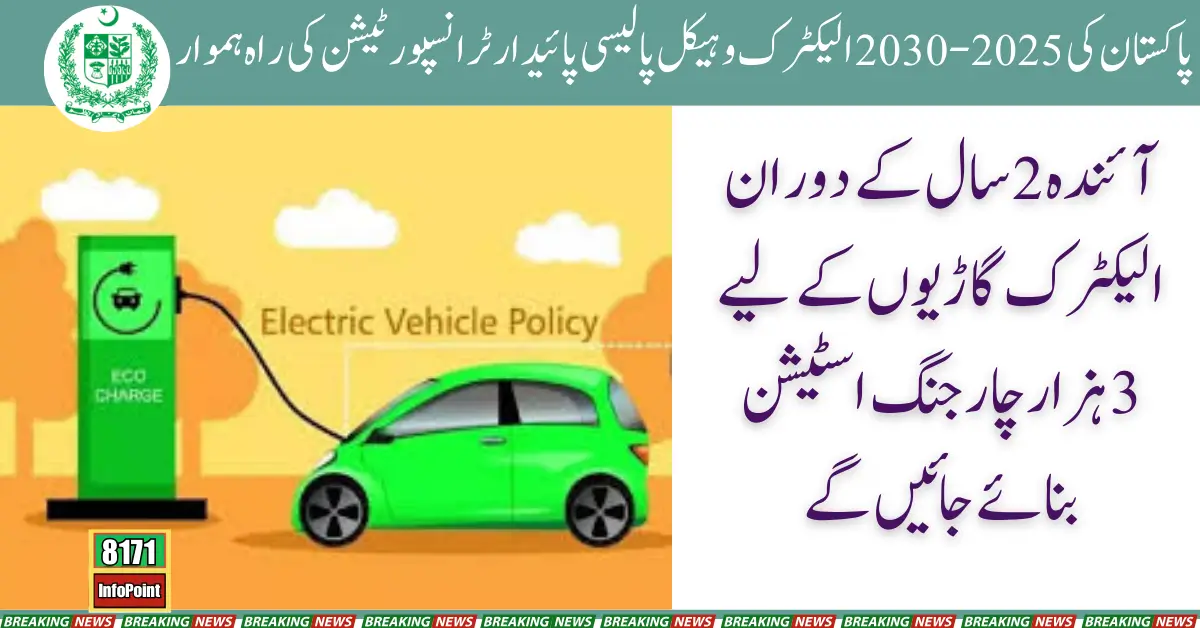Electric Vehicle Policy
Pakistan’s 2025-2030 Electric Vehicle Policy Paving the Way for Sustainable Transportation. As part of a broader energy transition plan, the Government of Pakistan has launched an expansion agreement to expand the use of electric vehicles across the country. According to the Electric Vehicle Policy released by the government for 2025 to 2030, Pakistan plans to operate 3,000 charging stations for electric cars in the next two years. The country’s reduction in dependence on fossil fuels is linked to cleaner air, a healthier standard of living, and sustainable development, primarily in the automotive sector.

How Collaboration Shapes the Project’s Success.
Two private Pakistani companies, Malik Enterprises, and Indus Valley, will collaborate with Chinese firm Adam Groups to develop charging station initiatives. With this initiative, the three companies are seeking to establish a charging station operator that is capable of meeting the growing demand for EV infrastructure across the country.
Malik Khuda Bakhsh-owned Malik Enterprises said the next two years are set to revolutionary for the electric vehicle sector in Pakistan. The Pakistani government has also set a broad target under the Energy Vehicle Policy to have 30 percent of all-electric vehicles on the road by 2030. The country is dependent on imported oil. As part of this policy, the creation of charging infrastructure is seen as a key factor in facilitating the transition to electric vehicles.
How the Charging Station Network is Expanding Across the Country.
Malik Khuda Bakhsh said the future of electric vehicles in Pakistan is bright as there are very few charging stations in the country, ranging from 11 to 13. This is a very small number that is set to expand under the guidance of the Pakistani government with Chinese partners. In the coming years. Khuda Bakhsh added that charging stations will installed from January, with a total target of 3,000 stations across the country in the next two years.
The first phase will target major cities like Karachi, Lahore, Rawalpindi, Faisalabad, and Multan but will eventually extend from Islamabad to Karachi along the motorway. All four provincial capitals as well as Azad Jammu and Kashmir and Gilgit-Baltistan will also covered. This will crucial to ensuring that charging infrastructure spread across the country. And that traveling across Pakistan will no longer a fear for electric vehicle owners due to battery life. Pakistan’s 2025-2030 Electric Vehicle Policy Paving the Way for Sustainable Transportation.
How Solar-Powered Charging Stations are Shaping a Sustainable Future.
Under this policy, charging stations not only powered by the national grid but also can powered by solar energy during the day. This dual-power approach ensures that charging stations will operate even during power outages, which are common in Pakistan. The use of solar energy will further support the government’s commitment to sustainability and renewable energy sources, reducing the environmental impact of charging electric vehicles.
Complete Guide to BISP Kafalat Program Payments 2025: Eligibility, Process, and Key Updates
Role of Skepticism in Meeting Challenges
However, automotive experts are cautious about the pace at which Pakistan’s transport sector can transformed. The absence of a comprehensive network for charging electric vehicles in Pakistan could hinder the mass adoption of electric vehicles. With only a handful of electric vehicles on the roads and an equal number of charging stations, it is not possible to increase the adoption of electric vehicles in Pakistan at present.
He added that a sustainable plan needed that focuses on more than just news from the government. The government needs to take practical steps to build a robust and reliable charging network across the country. Without such a network, the adoption of electric vehicles will remain limited to a niche market. He also pointed out that electric two-wheelers, such as motorcycles and rickshaws, have more immediate potential than four-wheelers. These smaller vehicles are more affordable and better suited to Pakistan’s local conditions.
How Past Lessons Shape Today’s Decisions.
As Raza said, CNG stations built with much fanfare but could not become a sustainable part of the country’s energy infrastructure due to poor management and lack of foresight. Raza warned that the same could happen with new electric vehicle charging stations if the government does not take a more systematic and strategic approach.
He stressed that the government should launch such large-scale projects after thorough research and planning. Only when a sustainable business model developed can the electric vehicle infrastructure in Pakistan succeed.
Punjab Bank Grants Kisan Cards to 280,000 Plus Farmers: Latest Update
Why Looking Ahead Today is the Key to Building a Better Tomorrow.
The Government’s Electric Vehicle Policy is undoubtedly a significant step towards addressing
growing environmental concerns in Pakistan, but it is clear that demand is also accessible and reliable for all users. In addition, it is important to ensure that the infrastructure integrated with other forms of renewable energy. Such as solar and wind, to further reduce the environmental impact of the electric vehicle sector. The private sector and foreign partners needed to ensure that the development of electric vehicles and the associated infrastructure is sustainable and financially viable. With the right strategies, the electric vehicle revolution can succeed in Pakistan, leading the country towards a cleaner, greener future.
